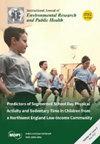The Association between Psychological and Behavioral Economic Factors and the Rapid Assessment Disuse Index (RADI) during the COVID-19 Pandemic
3区 综合性期刊
Q1 Medicine
International Journal of Environmental Research and Public Health
Pub Date : 2024-08-07
DOI:10.3390/ijerph21081040
引用次数: 0
Abstract
The deleterious health effects of prolonged sitting and physical inactivity are well-established, yet these behaviors are pervasive in modern culture. To inform interventions aimed at reducing sedentary behavior and increasing lifestyle activity, this study examined psychological and behavioral economic factors that may be associated with these behaviors. This cross-sectional study was conducted among 4072 adults in Israel. Participants completed a survey pertaining to lifestyle behaviors and economic preferences using an online platform in September 2020. The psychological and behavioral economic factors of interest were patience, self-control, risk-taking, grit, and general self-efficacy. Sedentary behavior and lifestyle activity (e.g., time spent moving about) was assessed using the Rapid Assessment Disuse Index (RADI) tool (higher score indicative of more sitting and less activity). Multivariable linear and logistic regression analyses examined the association between psychological and behavioral economic factors and RADI score. Among 4072 participants, those who were impatient (vs. patient, β: −1.13; 95% CI: −1.89, −0.38) had higher grit (β: −1.25, 95% CI: −1.73, −0.77), and those who were more risk-seeking (β: −0.23; 95% CI: −0.33, −0.13) had lower RADI scores (i.e., less sedentary, more active). Significant associations for grit and risk-taking were also observed when the RADI score was dichotomized, such that individuals who had higher grit or were more risk-seeking were more likely to be non-sedentary/active. No significant associations were observed for self-control or general self-efficacy. Higher grit and more risk-seeking were associated with a decreased propensity for sedentary behaviors and inactivity; these factors may provide targets for interventions aimed at reducing sedentary behavior and increasing lifestyle activity.COVID-19 大流行期间心理和行为经济因素与快速评估失效指数 (RADI) 之间的关系
久坐和缺乏运动对健康的有害影响已得到公认,但这些行为在现代文化中却普遍存在。为了给旨在减少久坐行为和增加生活方式活动的干预措施提供信息,本研究调查了可能与这些行为相关的心理和行为经济因素。这项横断面研究在以色列 4072 名成年人中进行。参与者于 2020 年 9 月通过在线平台完成了一项有关生活方式行为和经济偏好的调查。心理和行为经济因素包括耐心、自控力、冒险精神、勇气和一般自我效能感。久坐行为和生活方式活动(如活动时间)通过快速评估失用指数(RADI)工具进行评估(得分越高,表明坐得越多,活动越少)。多变量线性和逻辑回归分析检验了心理和行为经济因素与 RADI 分数之间的关联。在 4072 名参与者中,急躁者(与耐心者相比,β:-1.13;95% CI:-1.89,-0.38)具有更高的勇气(β:-1.25,95% CI:-1.73,-0.77),而那些更喜欢冒险的人(β:-0.23;95% CI:-0.33,-0.13)具有更低的 RADI 分数(即更少久坐,更多活动)。如果对 RADI 分数进行二分法处理,还可以观察到勇气和冒险行为之间的显著关联,即勇气越高或越喜欢冒险的人越有可能不久坐/越活跃。在自我控制或一般自我效能感方面没有观察到明显的关联。较高的勇气和较高的冒险精神与久坐行为和不活动倾向的降低有关;这些因素可能为旨在减少久坐行为和增加生活方式活动的干预措施提供了目标。
本文章由计算机程序翻译,如有差异,请以英文原文为准。
求助全文
约1分钟内获得全文
求助全文
来源期刊

International Journal of Environmental Research and Public Health
Medicine-Public Health, Environmental and Occupational Health
CiteScore
7.30
自引率
0.00%
发文量
14422
审稿时长
1 months
期刊介绍:
International Journal of Environmental Research and Public Health (IJERPH) (ISSN 1660-4601) is a peer-reviewed scientific journal that publishes original articles, critical reviews, research notes, and short communications in the interdisciplinary area of environmental health sciences and public health. It links several scientific disciplines including biology, biochemistry, biotechnology, cellular and molecular biology, chemistry, computer science, ecology, engineering, epidemiology, genetics, immunology, microbiology, oncology, pathology, pharmacology, and toxicology, in an integrated fashion, to address critical issues related to environmental quality and public health. Therefore, IJERPH focuses on the publication of scientific and technical information on the impacts of natural phenomena and anthropogenic factors on the quality of our environment, the interrelationships between environmental health and the quality of life, as well as the socio-cultural, political, economic, and legal considerations related to environmental stewardship and public health.
The 2018 IJERPH Outstanding Reviewer Award has been launched! This award acknowledge those who have generously dedicated their time to review manuscripts submitted to IJERPH. See full details at http://www.mdpi.com/journal/ijerph/awards.
 求助内容:
求助内容: 应助结果提醒方式:
应助结果提醒方式:


